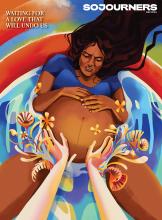I WRITE THIS two months before the November 2024 U.S. presidential election, knowing that it will land with you, dear readers, after all the votes are in and the course for the next four years is likely set. My insides lurch thinking about the potential outcomes. We are in the middle of the decisive decade for large-scale action to mitigate the worsening effects of climate change. Going in one direction or the other feels, sometimes, like a turn toward life or death for the planet.
Like many, I have learned to apply lessons from navigating the grief and pain of personal losses to our collective crises. I lost my dad suddenly to colon cancer earlier this year. A few weeks later, my mom was diagnosed with stomach cancer. Grasping for predictability amid the unknown, I tried to superimpose my dad’s illness onto my mom’s future. It did not help. My anxiety skyrocketed.
What helped, instead, was applying what Zen practitioners call “beginner’s mind.” A beginner has no background knowledge about a situation. They have no expectations for how things might unfurl. Approaching a situation as a beginner can open pathways that experts did not see.
Read the Full Article

